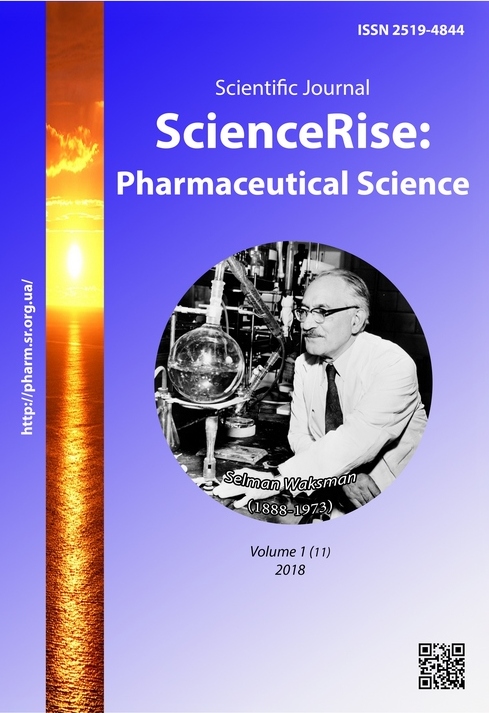Вивчення впливу первинної упаковки на стабільність оригінального ветеринарного препарату
DOI:
https://doi.org/10.15587/2519-4852.2018.124449Ключові слова:
ветеринарний препарат, первинне пакування, стабільність, цитрат сріблаАнотація
Важливе значення при створенні ветеринарних препаратів надається вибору первинної упаковки, матеріал якої безпосередньо контактує з лікарською формою. Стабільність зразків ветеринарних препаратів необхідно досліджувати в упаковках, які будуть застосовувати під час серійного виробництва ліків. Також необхідно дослідити процеси, які можуть відбуватися з активними фармацевтичними інгредієнтами під впливом речовин, що містяться в пакувальному матеріалі. На основі цих даних встановлюють терміни придатності препарату у відповідній упаковці.
Мета. Дослідження впливу первинної упаковки на показники якості розчину на основі цитрату срібла під умовною назвою «Аргоцид», а саме: ампул ємністю 10 мл та флаконів ємністю 50 мл скляних світлозахисних; пластмасових контейнерах (ампулах) ємністю 10 мл та флаконів ємністю 50 мл.
Методи. Методи досліджень проводили згідно з вимогами Державної Фармакопеї України.
Результати дослідження. Досліджено, що пластмасові контейнери місткістю 10 мл з поліетилену марки Pharmalene®, флакони по 50 мл з поліетилену низької щільності марки Riblene® FL 20 PH, не викликають змін показників якості ветеринарного розчину, регламентованих в специфікації та дозволяють зберігати препарат стабільним протягом терміну зберігання 2 роки. В процесі зберігання розчину на основі срібла цитрату у пластмасових контейнерах з поліетилену марки Pharmalene® місткістю 10 мл протягом 2 років відбулося зменшення об'єму до 1,5 %. Однак, швидкість випаровування розчинника занадто мала для того, щоб концентрація діючих речовин вийшла за допустимі значення.
Висновки. Встановлено, що всі досліджувані види контейнерів придатні для застосування в якості первинного пакування для ветеринарного препарату «Аргоцид», розчину для інтрацистернального введення на основі цитрату срібла, оскільки дозволяють зберігати препарат стабільним протягом 2-х років
Посилання
- ISO 15378:2011. Primary packaging materials for medicinal products – Particular requirements for the application of ISO 9001:2008, with reference to Good Manufacturing Practice (GMP) (2011). International Organization for Standardization.
- Nastanova 42-3.2:2004. Nastanovy z yakosti. Likarski zasoby. Spetsyfikatsiyi: kontrolni vyprobuvannia ta kryteriyi pryiniatnosti (2004). Kyiv: MOZ Ukrainy, 38.
- Swarbick, J. (Ed.) (2007). Encyclopedia of pharmaceutical technology. New York, London: Informa healthcare, 1171.
- Nastanova 42-3.16:2014. Nastanovy z yakosti: Likarski zasoby. Plastykovi materialy dlia pervynnoi upakovky likarskykh zasobiv (2014). Kyiv: MOZ Ukrainy, 22.
- Gudz', N. I. (2016). Osobye trebovaniya k upakovke dlya zhidkih parenteral'nyh i glaznyh lekarstvennyh form. Tovaroznavchyi analiz tovariv obmezhenoho aptechnoho asortymentu: materialy III naukovo-praktychnoi internet-konferentsiyi z mizhnarodnoiu uchastiu. Kharkiv: Vyd-vo NFaU, 90–91.
- European pharmacopoeia 8th ed (2013). Strasbourg: European Directorate for the Quality of Medicines & Health Care, 3655.
- Chuieshov, V. I., Hladukh, Ye. V., Saiko, I. V. et. al. (2013). Tekhnolohiya likiv promyslovoho vyrobnytstva. Ch. 2. Kharkiv: NFaU: Oryhinal, 638.
- Campbell, G. A., Vallejo, E. (2015). Influence of the glass packing on the contamination of pharmaceutical products by aluminium. Part III: Interaction container-chemicals during the heating for sterilization. Journal of Pharmaceutical Sciences, 104 (1), 52–62.
- Hussong, D. (2010). Sterile Products: Advances and Challenges in Formulation, Manufacturing and Regulatory Aspects – A Regulatory Review Perspective. AAPS PharmSciTech, 11 (3), 1482–1484. doi: 10.1208/s12249-010-9503-z
- Akala Emmanuel, O. (2010). Effect of Packaging on Stability of Drugs and Drug Products. Pharmaceutical Manufacturing: Regulations and Quality. John Wiley & Sons. doi: 10.1002/9780470571224.pse392
- Hroncich, C. (2016). Examining Blow-Fill-Seal Technology for Aseptic Processes Industry experts discuss common considerations and recent technological advancements in blow-fill-seal technology. Pharmaceutical Technology, 40 (6), 49–51.
- Amin, A., Dare, M., Sangamwar, A., Bansal, A. K. (2011). Interaction of antimicrobial preservatives with blow-fill-seal packs: correlating sorption with solubility parameters. Pharmaceutical Development and Technology, 17 (5), 614–624. doi: 10.3109/10837450.2011.557733
- Feutry, F., Simon, N., Genay, S., Lannoy, D., Barthélémy, C., Décaudin, B. et. al. (2015). Stability of 10 mg/mL cefuroxime solution for intracameral injection in commonly used polypropylene syringes and new ready-to-use cyclic olefin copolymer sterile vials using the LC-UV stability-indicating method. Drug Development and Industrial Pharmacy, 42 (1), 166–174. doi: 10.3109/03639045.2015.1038273
- Markarian, J. (2014). Blow-fill-seal Technology Advances in Aseptic Filling Applications. New advanced aseptic manufacturing technologies are available for filling liquid pharmaceuticals, including biologics. Equipment and Processing Report. Available at: http://www.pharmtech.com/blow-fill-seal-technology-advances-aseptic-filling-applications
- Simmchen, J., Ventura, R., Segura, J. (2012). Progress in the Removal of Di-[2-Ethylhexyl]-Phthalate as Plasticizer in Blood Bags. Transfusion Medicine Reviews, 26 (1), 27–37. doi: 10.1016/j.tmrv.2011.06.001
- Polova, Z., Almakayeva, L., Nehoda, T. (2017). Development of the composition of intramammary combined preparation based on silver citrate for veterinary. Ceska a Slovenska Farmacie, 66 (5), 227–233.
- Polova, Zh. N., Almakaeva, L. G. (2017). Issledovanie stabil'nosti obrazcov protivomastitnogo preparata «Argocid». Respublikanskiy nauchnyy zhurnal «VESTNIK» Yuzhno-Kazahstanskoy gosudarstvennoy farmacevticheskoy akademii, 4 (81), 154–159.
- Sayt TzOV «Brovafarma». Available at: http://brovafarma.com.ua/uk/news/evropejs-ki-tehnologii-virobnictva-za-gmp.html
- Derzhavna farmakopeia Ukrainy. Vol. 1 (2015). Kharkiv: Derzhavne pidpryiemstvo «Ukrainskyi naukovyi ekspertnyi farmakopeinyi tsentr yakosti likarskykh zasobiv», 1128.
##submission.downloads##
Опубліковано
Як цитувати
Номер
Розділ
Ліцензія
Авторське право (c) 2018 Zhanna Polova, Lyudmyla Almakayeva

Ця робота ліцензується відповідно до Creative Commons Attribution 4.0 International License.
Наше видання використовує положення про авторські права Creative Commons CC BY для журналів відкритого доступу.








